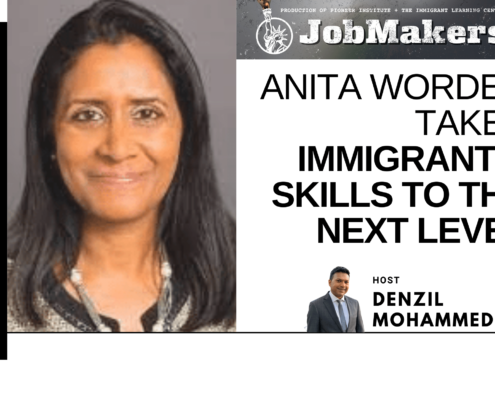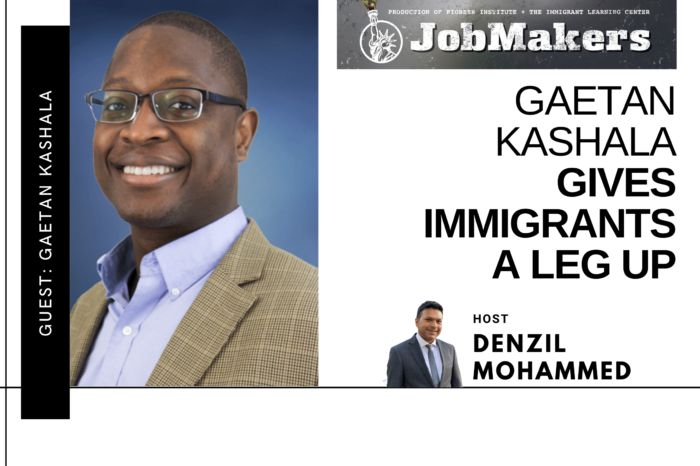Gaetan Kashala Gives Immigrants a Leg Up
/in Economic Opportunity, Featured, JobMakers, News /by Editorial StaffThis week on JobMakers, host Denzil Mohammed talks with Gaetan Kashala, immigrant from the Democratic Republic of Congo, co-founder of Globex Corporate, a consulting firm connecting the U.S. to Central and Western African businesses and governments, and also the engagement director for AIM, the Associated Industries of Massachusetts. Gaetan has built a career helping immigrant and other minority small business owners in the Bay State by giving them the opportunity for a crack at the American Dream. And he’s seen the results: thriving businesses, growing families and community development. He shares their stories and his own, of a legacy built by his father in Cambridge, in this week’s JobMakers.
Guest
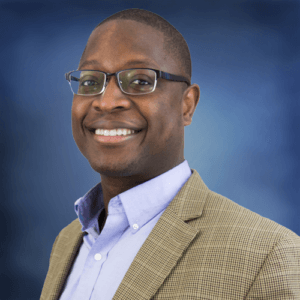 Gaetan Kashala is responsible for engaging with Associated Industries of Massachusetts (AIM) members in Eastern Massachusetts in order to learn about their business priorities and challenges. This knowledge is then utilized to identify and deliver the appropriate AIM services to advance those members’ interests in the Common-wealth. Prior to joining AIM in 2020, he worked for Dorchester Bay Economic Development Corporation where he established partnerships and implemented programming that sought to increase economic mobility and workforce development at the community level. If he wasn’t at AIM, he would be traveling throughout Sub-Saharan Africa but sure to be back by kickoff of the Patriots’ season opener.
Gaetan Kashala is responsible for engaging with Associated Industries of Massachusetts (AIM) members in Eastern Massachusetts in order to learn about their business priorities and challenges. This knowledge is then utilized to identify and deliver the appropriate AIM services to advance those members’ interests in the Common-wealth. Prior to joining AIM in 2020, he worked for Dorchester Bay Economic Development Corporation where he established partnerships and implemented programming that sought to increase economic mobility and workforce development at the community level. If he wasn’t at AIM, he would be traveling throughout Sub-Saharan Africa but sure to be back by kickoff of the Patriots’ season opener.
Get new episodes of JobMakers in your inbox!
Read a Transcript of This Episode
Please excuse typos.
Denzil Mohammed:
I’m Denzil Mohammed and this is Jobmakers.
Denzil Mohammed:
Let’s face it. The world is unequal. Not everyone everywhere is given the same chances. It opportunities and avenues to fulfill their potential to succeed. This goes for continents countries, and even within our own borders, there are often things that stand in the way for some people for Gaetan Kashala, immigrant from the Democratic Republic of Congo, co-founder of Globex corporate, a consult from connecting the US to central and Western Africa, and also the engagement director for aim the Associated Industries of Massachusetts. He knows this all too well, both in the Congo and in the US for a host of reasons. Many of us are oblivious to the barriers that exist. For some groups of people Gaetan has built, are helping immigrant and other minority, small business owners in the Commonwealth by giving them that opportunity for a crack at the American dream. And he’s seen the results, thriving businesses, growing families and community development. He shares their stories & his own of a legacy built by his father in Cambridge in this week’s JobMakers.
Denzil Mohammed:
Gaetan Kashala of the Associated Industries of Massachusetts. Welcome to JobMakers. How are you?
Gaetan Kashala:
I’m doing well. How are you doing?
Denzil Mohammed:
Pretty good. I’ve escaped the cold for a little bit, so I’m thankful. So tell me a little bit about your business. It’s a very interesting business, and I know it’s one of the things that you do, but you started this with your father and you, you connect the us to central and Western Africa, right? Yeah,
Gaetan Kashala:
Yeah, absolutely. Absolutely. So the company it’s called global enterprise services corporation, and it’s a com it’s a consultant firm that when we started out initially focused on government relations, right. We would partner with American government affairs firm and then travel to different countries in Sub-Saharan Africa mainly central and Western Africa in order to speak with governments, policy makers there about us serving as their representative in the United States whether this is before the executive branch, legislative branch,lenders like the IMF, world bank and EU. So, you know, step one in our growth strategy was really developing deep relationships with African political leaders. And then, you know, once those relationships were in place,given that we were based out of the United States,we would reach out to the members of the business community here,uin order to see if they were interested to, to see if they were interested in exploring, you know, commercial,uphilanthropic opportunities that existed on the African continent. So really symbiotic relationship in that,uor process in that, you know, you, you,uyou know, developed a level trust,uwith the governments and then,uleverage that to, you know, see what type of,ubusiness business development needs,uyou know, strategic communication needs that,uentities and the United States, Europe and,uChina,uhad. So
Denzil Mohammed:
As a way of building up entities and initiatives in parts of Africa, through partnerships in the us, that’s, that’s incredible in the us. And you say as all as well, Asia and the EU yeah, you are very familiar with the Western central Africa, because you’re from the Democratic Republic of the Congo. Tell us a little bit about what life was like, if you can recall growing up there.
Gaetan Kashala:
Sure, sure. So, so I, I was born in KHA in the capital of the democratic Republic of Congo about, you know, 13, 13, million, 14 million residents lived there. So I, I guess spent the first seven years of my life there, before moving to the United States. My father was pursuing a a PhD from Harvard university. So you know, that’s, that’s what brought us there. That’s what brought us to the United States. But in terms of memories and recollections from, from my time there, I just, you know, remember the vibrancy and the energy of being in the capital and just, you know, it’s situation where you would see people hustling all the time, you know, whether that’s where the street vendor is, the it, it just, there was this entrepreneurial capacity there that in ma in many ways was a means for folks to put food on their table and, you know, bring money and resources to their families.
Gaetan Kashala:
I don’t know how familiar you are with, with the, just kind of the socioeconomic composition of of Congo Ora in general, but, but it it’s a fairly impoverished community. I would say, you know over 70, 80% of the people are living, you know, below the poverty line from an international perspective. So, so there’s, there’s a real kind of gap between the haves and the have nots and just, it was always, even as I think back on on it you know, it was always really just kind of invigorating to see the vibrancy and, and the hustle that, that a lot of the people there had, because in many ways they were, they were hustling to, to stay alive, to keep their family alive. Your
Denzil Mohammed:
Father came in to do his PhD, you yourself studies at Tufts. So one of the things the American public really doesn’t know is that the smartest immigrant group is actually African immigrants to the US. They have the highest educational attainment as a group. Much of your work now is focused on this idea of engagement, connection, economic prosperity equity and you’re the engagement director at the Associated Industries of Massachusetts. And I find it interesting that they say in their mission, we further assert that such economic opportunity must reflect the principles of diversity, equity and inclusion. Everyone must have a voice on the economic future of Massachusetts. What does that mean?
Gaetan Kashala:
Yeah. I’m glad you asked that question. So,I currently serve as a co-chair on AIM’s diversity equity and inclusion staff council. AIM had recognized that, you know, it wanted its membership to reflect to the, kind of the, the diversity that exists in the, in Massachusetts. Uso, and, and, and they wanted to serve as a con as a convener of, you know, discussions between the business group as well,uthe business,ucommunity, as well as, you know,uhistorically marginalized population, but, you know, ultimately what we’re looking to do from a DEI perspective, it’s just to really make sure that our membership, you know, it looks like what, what we see,uout in Massachusetts, and then we’re, we’re playing a role to support that effort, whether that’s through DEI training programs that we offer to members, whether that’s through highlighting the accomplishments of black, brown,women led businesses. You know, we understand that, you know, this is a continual learning process and we want to be just kind of that convener of productive conversations.
Denzil Mohammed:
Tell me a little bit about some of the immigrant owned businesses that, that you’ve interacted with and, you know, there’s the Southeast, the Asian business coalition and various other associations like that. Do what, what makes them, do they stand out at all to you or does anything, you know, you talked about the hustle mm-hmm, <affirmative> in, in Kinshasa. Do you see that sometimes in some of these business owners?
Gaetan Kashala:
Yeah, absolutely. And it’s really amazing because you know, whether it’s the groups that I’ve interacted with, or I currently, I live in Dorchester right now in the Savin Hills area. And, and you see, you know, business, whether it’s Vietnamese businesses, a Haitian businesses that have been, you know, I’ve heard of countless situations where, you know, the one person comes to the United States, immigrates here, starts up a business, begins sending money back home in order to bring more family members here, the family members come here and then they come in and work for the business, support the business and, you know, importantly add tremendous value to the communities in which they’ve immigrated to you know, so that’s, that’s one thing these are not, and not to overly general, but in my experience, these are not people that are here looking for handouts.
Gaetan Kashala:
They are came here with a belief in the American dream a belief in the American meritocratic society, which is also, you know, something I, I should have brought up earlier relative to Congo, because in many ways, you know, you have your haves and you have your haves nots, right? Sometimes the haves is you know, you are a have because of where you were born or what tribe you are in. And if that tribe is empowered, then you’re getting jobs. So, you know, a lot of the motivation for coming to the United States, it’ll be a lot of the attraction. It’s just that belief that in America, you can accomplish anything. You know, you put, you put some hard work into it, but, but there there’s opportunity here. And, and that that’s, I, I see on a daily basis, you know, if it’s like, I walk, get my coffee, you know, it might be Vietnamese coffee you know, it’s really uplifting to see.
Denzil Mohammed:
That’s incredible. And, you know, Americans don’t realize how much of the world is it, like what you just talked about, separated by glass and tribe and lineage and their last names, the color of their skin where these are, these are really real barriers that have been around for generations and generations. And I like that you, you, you, you know, you’ve met these business owners, you’ve talked to them over the years. You’ve pushed for economic equity in, in dochester in your previous roles going down at the community level and talking and meeting these people, seeing the shared diverse city that we have in Massachusetts, for instance, you know, it’s not, it’s not a situation where there’s one big dominant immigrant group. It’s, it’s been evenly split, you know, Haitians, Brazilians, Chinese Indians. How have you seen immigrant entrepreneurship impact the Massachusetts economy and some of the local economies that you’ve been involved with?
Gaetan Kashala:
Yeah. I I’ve seen it in a number of ways. Right.
Denzil Mohammed:
You mentioned that you live in Savin Hill and I think of Fields Corner
Gaetan Kashala:
Yeah, absolutely. You think of Fields Corner, Uphams Corner. So when I worked at Dorchester Bay Economic Development Corporation, I was responsible for building up the economic mobility program. And an interesting thing about Dorchester Bay is it’s a certified financial institution. So they essentially had a bank a mission driven bank that was focusing on lending money and disenfranchised communities. Right. So we would get funds from either the small business administration or the treasury department. And our charge was to provide capital to those that historically had a difficult time access in just kind of those traditional sources. So capital, we supported a whole number of entrepreneurs, many of them were immigrants, right?
Gaetan Kashala:
So I had the opportunity to meet with these folks hear about, you know, the, the, what businesses they wanted to put in place and then work with them, you know, whether it’s through, by providing technical assistance. Okay. Just how to put together business plan, marketing, and website. These are, you know, the type of, you know, basic financial statements that you’re gonna meet. So, so, so that it was in that experience that, that I had, you know just kind of that firsthand look into, you know, the, kind of the immigrant entrepreneur story right. I, I recall all working with a lady from Kenya, I believe, but, you know, she had been working had come here from Kenya, had been working in the healthcare space for, for a while, you know started off as a CNA and then went into administration.
Gaetan Kashala:
So she was director of a nursing home and decided that, okay now is, you know, given her experience given which led her to really see the need for like healthcare or staff in, she wanted to start a, a home healthcare staff in operation. So, you know, it was working with her hand in hand, wrote her business plan, put together the website. And, you know, now in the process of trying to solicit some funding that she’ll need to be able to that she’ll be able to really kick off her operation. And importantly, especially in, in whether in nursing home care, you know, the vast majority of the caregivers are, are immigrants, you know, are immigrants. And, and that, that rep that’s gonna, at least for the story I was talking about specifically that represents about 90 to 95% of their workforce.
Denzil Mohammed:
So that’s, yeah. I mean, we’ve, we’ve, it we’ve, we’ve we’ve are the ones taking care, the sick, the elderly <affirmative> generally, but even through this pandemic, it’s your Jamaican nurse or your Filipino nurse. I mean, this is just a, a, there a huge part of our healthcare system in many other industries. I wanna push back on two things briefly. One is, you know, people are gonna listen to this podcast. Hey, you talk about, you know, it was basically that was giving out money to these decent franchise communities. And they’re gonna call that a handout. Was that a handout?
Gaetan Kashala:
No, no, absolutely not. Absolutely not. Because for, well, one just kind of plain definitional reason, they would the funds would be transferred in the form of a loan, but very but low interest loan relative if, to what you would see out there in, in the normal market. Right. So you know, the, there is nothing being handed out at least through, through our, our, our loan process. Another thing I would just, you know, have folks be mindful of some of the challenges and, and, and I would say a lot of these structural challenges that exist that prevented you know, a lot of these groups from being able to access capital. So, you know, I, I wouldn’t call this a handout in any way that you would say, okay, my parent paying for my college education was, was a handout.
Gaetan Kashala:
You know this is really about providing opportunity. This is about providing opportunity in my, in my job, my work there was all built around how do you, how do you to be able to achieve economic mobility and, and our thesis was that you focus on providing them with, you know, human capital, you know, who are the individuals that they’re around, that they can leverage and network to be able to just kind of advance the social capital, what are the, what are the, what’s the infrastructure and institutions that are around there, whether it’s from a school perspective, different trainings and things like that. And then finally, it’s the financial capital, you know, with that the, you know, money obviously is the oxygen that allows us to do a lot of different things. So you know, we, we, we, I kind of look at it from, from those in, from that framework where, you know, in order to position folks for economic mobility, gotta focus on that human social and, and financial capital fund ways to introduce that expand that to, to different businesses, individuals and what have you,
Denzil Mohammed:
So you are saying that there are systemic barriers in the us, even, even here where we think that there’s just this level playing field. Another thing I wanna, I wanna challenge you on is, you know, in terms of your business, your, a consulting business, the, the model is about connection. It’s about, you know, bridging the divides between continents and countries. But we, in an era, I would say that where people wanna close in, they wanna close the borders. They wanna look inward it’s about America first. How have you seen this, this notion of bridges and connections with all these different parts of the world in the us? Like, has that been a good thing in your estimate?
Gaetan Kashala:
Yeah, I mean, so in one, in one way, I understand what you are saying, but I, I think we got, we have to be careful about, you know, the connection we made between the political rhetoric that we hear and see, and, you know, what’s going on you know, business to business. Businesswise, I, you know, I take, for example, like the climate change, right, you would hear you hear a lot of or heard a lot of talk about the, the Glasgow conference. But then there’s, oh, these governments, aren’t making commitments, the politicians aren’t making, you know, the, the realistic commitments, but then if you look at the business to business level, you see that there there’s tremendous, tremendous work being done. Fundamentally, if you’re able to value to someone, whether that’s an individual or an organization you’re able to, to provide them with something that they need, that they cannot get elsewhere, or can’t get elsewhere at a you know, the, that at a price.
Gaetan Kashala:
That makes sense. I think that’s, that’s ultimately what this is all about, right? It’s about, you know, you, you’re, you’re seeing the demand, that’s out there. You’re seeing there’s a need out there, whether that’s for construction worker, whether that’s for, you know, coffee and, and, and you’re filling that need. So if you looking at things from an, an immigrant entrepreneur perspective, it’s just about really, you know,ugoing out there, hustling, trying to identify those opportunities and be able to effectively articulate, communicate, you know, what value you bring relative to the other options that are on the table or in the market.
Denzil Mohammed:
I love the way you talk about markets, the economy, business to business, and how business moves. These, these policies changes even, you know? Yeah. And for the, for the betterment of all of us, for the betterment of the population I wanna bring it back to you and your family, and, you know, you move here when you were really young, but you don’t remember the, the impoverished parts of Consta. You do remember what it was like, how do you feel about the us as your adopted home? I
Gaetan Kashala:
Really feel grateful to be here, especially knowing, you know, what the situation exists and Congo you know, from a poverty perspective, from an interest structure perspective, whether you’re talking bridges, clean water, you know, electricity I think my coming to the US, it really, it was almost like a, a clean slate, you know or a canvas that you can draw your story on. And it was a cleaner canvas then probably existed in, in Congo. So there’s a lot more opportunity, a lot of different things that, that could be drawn on, on that campus. And that’s, that’s really you know, something that, that that, you know, should be appreciated.
Denzil Mohammed:
And I think that you drawing something that’s really exceptional, something that that capitalizes on the diversity that, that we all experience. And I’m glad that your father made that move. Yeah. Thank you very much for be thank you very much for, for you and your family being here and for advancing the things that you’re advancing through your work, through your business, through aim GA gaping Cala, thank you so much for joining us in job. So it’s a real pleasure
Gaetan Kashala:
Talking to you. Yeah, likewise, likewise, thank you very much for having me.
Denzil Mohammed:
Jobmakers is the weekly podcast about immigrant entrepreneurship and contribution produced by Pioneer Institute, a think tank in Boston and the Immigrant Learning Center in Malden, Massachusetts, a not for profit that gives immigrants a voice. Got comments, questions, or know someone we should talk to? Email Denzil@jobmakerspodcast.org. Thank you for joining us for another inspiring conversation. I’m Denzil Mohammed. See you next Thursday at noon for another JobMakers.
Recent Episodes:
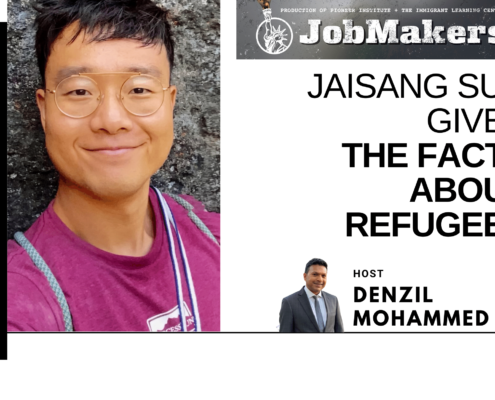
Jaisang Sun Gives the Facts About Refugees
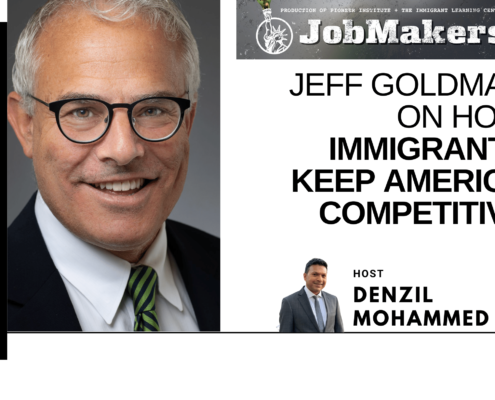
Jeff Goldman on How Immigrants Keep America Competitive

Trevor Mattos Shows How Massachusetts Runs on Immigrants
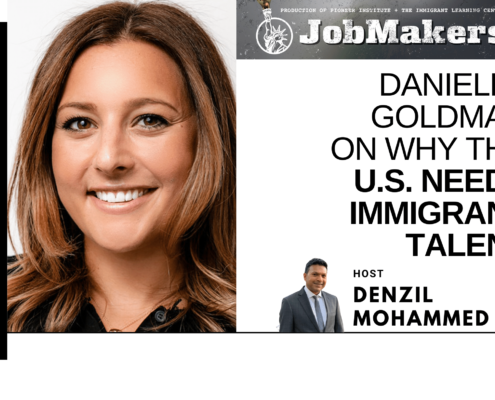
Danielle Goldman on Why the U.S. Needs Immigrant Talent
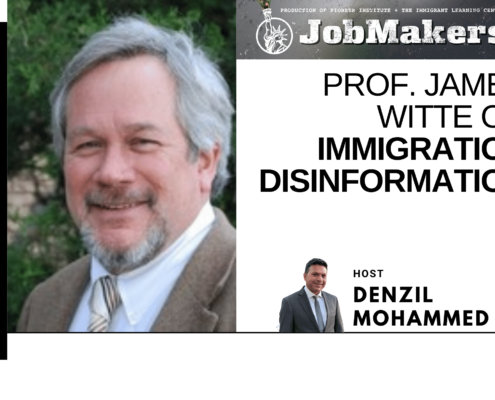
Prof. James Witte on Immigration Disinformation
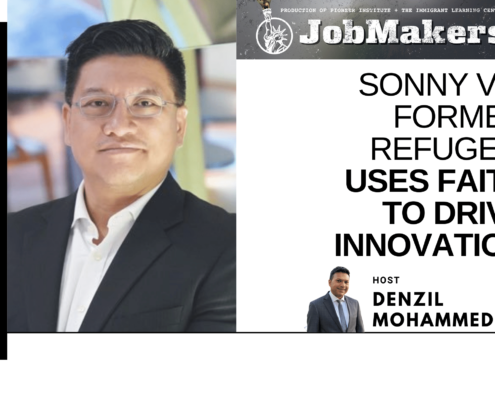
Sonny Vu, Former Refugee, Uses Faith to Drive Innovation
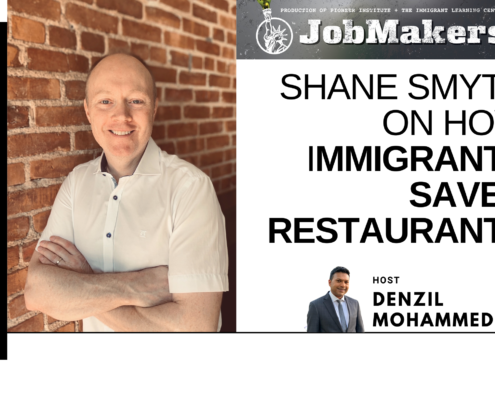
Shane Smyth on How Immigrants Saved Restaurants
